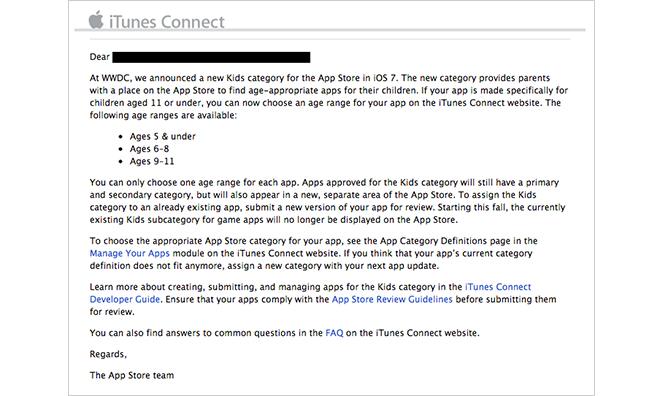An email sent out by Apple on Friday asked developers who are making apps for children under the age of 11 to classify their software in one of three age ranges, which will make it easier for parents to discover age-appropriate titles when a new "Kids" App Store category debuts with iOS 7.
After announcing plans for the new "Kids" category at this year's Worldwide Developers Conference, Apple is taking steps to have that section curated before it launches in the iOS 7 App Store this fall.
With the category's addition, children's apps will still be assigned a primary and secondary category, such as Games and Lifestyle, but may also carry designations for specific age groups. According to the email, developers can choose from three ranges: ages 5 and under, ages 6-8 and ages 9-11. Only one age range can be selected per app.
The note comes as Apple makes various modifications to its existing iTunes usage policies as they specifically pertain to children.
Motivated by its iPad in eduction initiative, the company is for the first time allowing minors under the age of 13 to open and manage Apple IDs to be used on the iTunes Store, App Store, iBookstore and Mac App Store. Approved educational institutions can apply for the student accounts only after gaining permission from parents or guardians.
Earlier this week, Apple also redrew its App Store Review Guidelines to comply with changes made to the Children's Online Privacy Protection Act (COPPA). The federal statute, which limits the scope of data websites and similar entities can harvest from children under the age of 13, was updated to prohibited the collection of photos, video and audio from underage users.
In line with the adjustments made to COPPA, Apple added a new section to the Review Guidelines document, laying out what app developers can and can't include in apps made for children. For example, developers are prohibited from using targeted ads.
With its policy changes, Apple is looking to further the iPad's domination of the lucrative education market. The company has already inked a deal to supply all 640,000 students in the L.A. Unified School District with iPads by the end of 2014.
 Mikey Campbell
Mikey Campbell







-m.jpg)






 Chip Loder
Chip Loder
 Wesley Hilliard
Wesley Hilliard
 Marko Zivkovic
Marko Zivkovic

 Christine McKee
Christine McKee
 Amber Neely
Amber Neely

 Malcolm Owen
Malcolm Owen








8 Comments
This is another thing that seems to set Apple apart from their competition. I know many people don't like the "locked out" environment but I appreciate their effort to protect young children. I would like to think this is an ideal that they are unwilling to trade for profit unlike many other companies.
No in-app purchase options, I take it ¿ Lame. Yes, excellent thing they're doing here. I presume Android has this already, as they're the [i]Checkbox Software Platform[/i]
No in-app purchase options, I take it ¿
Lame. Yes, excellent thing they're doing here. I presume Android has this already, as they're the Checkbox Software Platform
The Play Store doesn't have this. They use a rating system of 4 'maturity levels' in order to restrict access when needed (thru the use of checkboxes )
A good step on Apple's part. Doesn't really warrant turning into an 'Android's system is better' or 'Apple was first' argument as I believe Kmart has had this system in place for the last 30 years or so =p They could improve it further by adding controls so parents can set what 'age range' apps an account can download.
With the advanced precision, security, and veracity of fingerprint scanners on iOS devices, it would seem to be feasible that Apple could offer parents the ability to control their children's access as well as spending allowances within the App Store. These settings could all be set by the parents and associated with each child's prints.